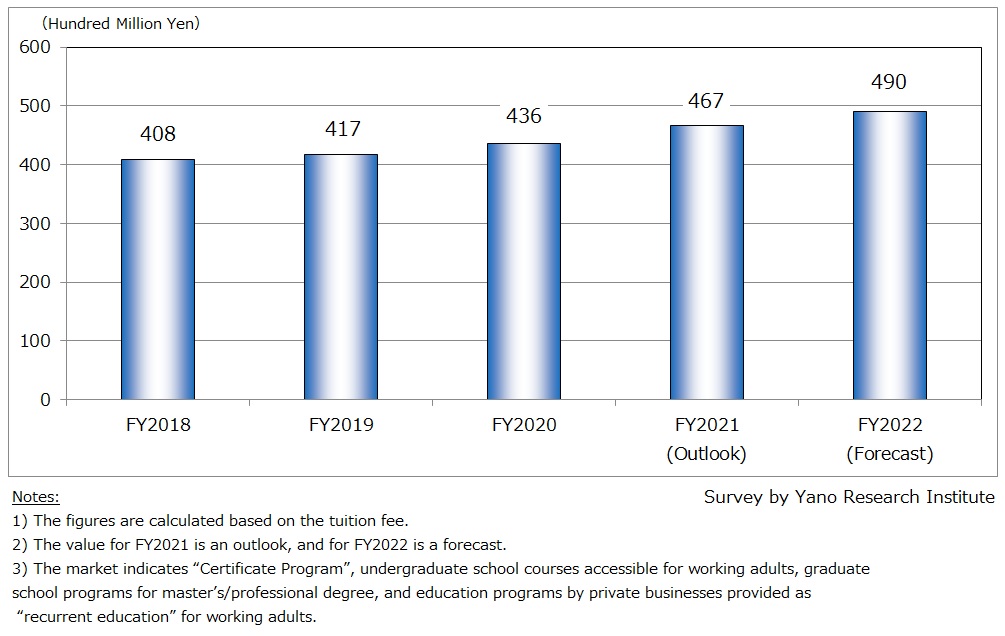No.2919
Recurrent Education Market in Japan: Key Research Findings 2021
FY2021 Recurrent Education Market Forecasted to Rise by 7.1% YoY to 46.7 Billion Yen
Yano Research Institute (the President, Takashi Mizukoshi) has conducted a survey on the domestic recurrent education market, and found out the market trends, the trends at market players, and future perspectives.

Market Overview
Size of the recurrent education market for FY2021 (based on the tuition fee) is valued at 46.7 billion yen, up 7.1% from the previous fiscal year. Due to drastic changes with the times, such as DX (digital transformation), the 100-year life, and new normal, there is a pressing need for working adults to learn/upskill to adjust to new circumstances. Meanwhile, the government promotes enhancement of recurrent education to “create a society where relearning and starting over are welcomed anytime”. On the other hand, enterprises exhausted from traditional Japanese employment system (seniority-based wage and lifelong employment) are shifting towards ‘job-focused’ recruiting* and training. These factors have created the market environment that increases attention to the recurrent education.
Due to the outbreak of COVID-19, dozens of university programs struggled to attract students in FY2021. Still, the recurrent education market expanded because the increase of individuals reassessing career plans amid remote work/work-from-home, while accelerated digital transformation has led to strong sales of educational programs at private businesses. Soaring sales of online programs contributed to the market growth in particular. By view of course themes, educational programs on IT technologies are distinctly popular, reflecting the serious shortage of digital tech talent.
* e.g. Employing person with expertise, person ready to work.
Noteworthy Topics
Issues Faced by Recurrent Education
Visibility of “recurrent education”, the educational services for working adults that aim to relearn earnestly for career change and/or to adjust to the changes in social environment, is increasing. However, it is difficult to say that it has become widespread; many universities are challenged with profitability and struggling to attract students.
In a meantime, Ministry of Education, Culture, Sports, Science and Technology (MEXT) has been making efforts to increase presence of the educational programs by reinforcing information delivery through “Manapass”, a portal site promoting recurrent education for working adults.
It should be noted that, although needs for relearning have been recognized among individuals and enterprises, relearning has not been successful in stimulating career mobility in Japan. Low job mobility is a big challenge to address for expanding recurrent education. Nurturing social climate favorable for career mobility and improving systems to support the movement are required.
Future Outlook
Size of the recurrent education market for FY2022 (based on the tuition fee) is forecasted to rise by 4.9% year-on-year to 49 billion yen. While uncertainty about the future is increasing, demand for the recurrent education market is projected to grow continuously against the background of stronger tendency among individuals to review their career plans, change in skills required by enterprises/society, and governmental movements to enhance “recurrent education”.
Research Outline
2.Research Object: Universities and private businesses providing recurrent education programs
3.Research Methogology: Face-to-face interviews by the expert researchers, interviews via telephone/fax/email, and literature research
What is the Recurrent Education Market?
The recurrent education market in this research refers to educational services for working adults to relearn earnestly, developing skills for their career change and/or to adjust to the changes in social environment. Specifically, the market indicates “Certificate Program*”, undergraduate school courses accessible for working adults, graduate school programs for master’s/professional degree, and education programs by private businesses provided as “recurrent education” for working adults.
Nevertheless, open courses offered at undergraduate schools, corporate training services, education courses by private businesses designed for obtaining a qualification, and lifelong learning programs that mainly provides courses not directly linked to business are excluded from the research target.
*Note: “Certificate Program” in Japan refers to a set of academic courses offered at universities, coordinated specifically for working adults, in accordance with Article 105 of School Education Law and Article 164 of Cabinet Order of School Education Law. Students are awarded with a “certificate” (not diploma) upon completion of the courses.
<Products and Services in the Market>
Recurrent Education Programs
Published Report
Contact Us
The copyright and all other rights pertaining to this report belong to Yano Research Institute.
Please contact our PR team when quoting the report contents for the purpose other than media coverage.
Depending on the purpose of using our report, we may ask you to present your sentences for confirmation beforehand.